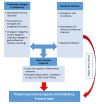Periodontal Pathogens and Preterm Birth: Current Knowledge and Further Interventions
- PMID: 34207831
- PMCID: PMC8227634
- DOI: 10.3390/pathogens10060730
Periodontal Pathogens and Preterm Birth: Current Knowledge and Further Interventions
Abstract
Preterm labor is defined as a birth before 37 weeks of gestation and occurs in 5-20% of pregnancies. Preterm labor, as multifactorial entity associated with a high risk of neonatal morbidity and mortality, is influenced by maternal, fetal and environmental factors. Microbiological studies suggest that infectious pathogens may account for 25-40% of preterm birth. Infections of different sites, like genital, urinary tract infections, and pneumonia, are linked to the preterm labor. The most recent epidemiological studies consistently report that maternal periodontal disease is associated with preterm delivery, as well as the association between the presence of pathogenic oral bacteria in the placenta and adverse pregnancy outcomes. On the other hand, some previously published papers found periodontal bacteria in placentas of term pregnancies. In spite of a huge research done on the topic, both experimental and clinical, there are many controversial opinions about the role of periodontal infections in preterm birth. Thus, this comprehensive review addresses this very important topic and evaluates novel strategies of preventive and therapeutic approaches.
Keywords: periodontal disease; periodontal pathogens; pregnancy; preterm birth; preterm labor.
Conflict of interest statement
The authors declare no conflict of interest.
Figures
References
Publication types
LinkOut - more resources
Full Text Sources


